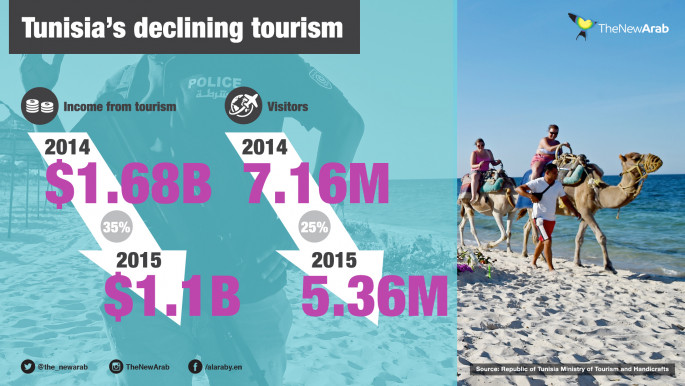
Tunisia's suffering tourism industry
Terror attacks and regional conflicts have caused Tunisia's visitor numbers to plummet, with no light yet in sight for the country's catastrophe-stricken tourism industry.
3 min read
Tourists and locals observe a minute's silence near the site of the Sousse attack [Anadolu]
Following the massacre of 24 people at Tunis' Bardo Museum and then the attack at the seaside resort of Sousse in which 34 people died in 2015, Tunisia's once flourishing tourism industry has suffered huge losses.
In the immediate aftermath of the atrocities at Sousse, where the majority of the dead victims were foreign holidaymakers, the number of visitors to Tunisia dropped immediately.
This completely reversed a positive trend for Tunisia's tourism sector. Prior to the attack at the coastal resort, the country's number of British visitors - who were also the majority nationality among the Sousse victims - was set to break records for the early months of 2015.
A year later, however, and the number of British sun-seekers in the North African nation has crashed by 93.2 percent for the first five months of 2016.
Elsewhere, alternative destnations for travellers seeking the warm climes of the Mediterranean seem to have enjoyed a spurt of growth amid Tunisia's traveller woes.
New figures from Spain show that tourist numbers in the first four months of 2016 have jumped as much at 11-13 percent as compared to the previous year.
In particular, the Southern European nation has seen a surge in the number of British visitors - many of whom may otherwise have visited Tunisia if not for UK's warning against all but essential travel to there.

In response to this tide of fear that threatens to wreck its tourism sector further, Tunisia's government has pleaded with countries from which it used to derive swathes of travellers.
Despite this, travel warnings against visiting Tunisia remain in place, with the UK's foreign office maintaining its firm stance well into peak tourist season.
Such warnings have contributed greatly to the North African nation's slump in visitor numbers, with many travel companies having ceased operations related to Tunisia since last summer.
The impact of the damage caused by falling visitor numbers has been immense. This week, Tunisia's dinar fell to record lows versus the euro and the US dollar, with the country reporting a dip in foreign direct investment as well as foreign reserves due to the catastrophe-stricken tourism industry.
Following the attack at Sousse, many observers argued that lessons were not learnt from the Bardo museum attack, despite the country's authorities vowing a "merciless war against terror" in its aftermath.
Today, Tunisia's tourism sector faces an uphill struggle to restore traveller confidence, amid domestic terror threats and regional conflicts that are never far from international newspaper frontpages.
Whether Tunisia can restore this confidence is perhas not the question, but rather how long it will take to do this. At present, it looks a long way off, however the country remains determined to end this dark spell as soon as possible.





 Follow the Middle East's top stories in English at The New Arab on Google News
Follow the Middle East's top stories in English at The New Arab on Google News


